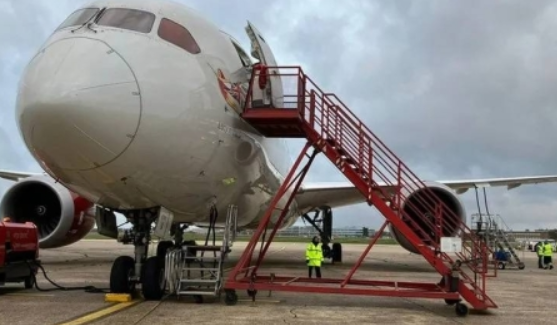World’s 1st Transatlantic Flight Using 100% Green Fuels Takes Off
Virgin Atlantic has made history with the world’s first transatlantic flight powered by 100% Sustainable Aviation Fuel (SAF). The flight, named Flight100, departed from London’s Heathrow Airport and is en route to New York’s John F. Kennedy International Airport. Here are the key details:
Key Points
- Significance: Flight100 is a milestone in sustainable aviation, demonstrating the feasibility of SAF as a safe replacement for traditional jet fuel.
- Aircraft: The flight is operated by a Virgin Boeing 787, equipped with Rolls-Royce Trent 1000 engines.
- Fuel Composition: The SAF used in Flight100 is a “unique dual blend” comprising 88% HEFA (made from waste fats) and 12% SAK (derived from corn waste).
- Passengers: While not carrying paying passengers or cargo, notable passengers include Virgin Atlantic founder Richard Branson, CEO Shai Weiss, and UK Transport Minister Mark Harper.
- Route: The Boeing 787, filled with 50 tonnes of SAF, is flying from London to New York, showcasing the potential of “green fuel” for long-haul flights.
- SAF Impact: The use of SAF aims to significantly reduce the carbon footprint of aviation, contributing to efforts to combat climate change.
- Research Collaboration: The project involves collaboration between major companies, including Rolls-Royce, Boeing, and BP, as well as academic institutions such as Imperial College London and the University of Sheffield.
- Environmental Assessment: Researchers from Imperial and Sheffield will assess the climate effects of Flight100, analyzing emissions and potential contrails.
- Industry Decarbonization: SAF is considered a crucial tool for the aviation industry to reduce its net emissions and achieve decarbonization goals.
- COP28 Timing: The flight precedes the COP28 climate talks in Dubai, where discussions on the future role of fossil fuels and emission reduction commitments are expected.
Challenges and Debates
While celebrated as a positive step, some environmental groups caution against “greenwashing” and emphasize the need to prioritize reducing flights and reliance on fossil fuels. The use of SAF, while promising, currently represents a small fraction of global jet fuel usage.
The success of Flight100 contributes to ongoing discussions about the aviation industry’s transition to sustainable practices and the challenges associated with scaling up SAF production and adoption.
Month: Current Affairs - November, 2023
Category: Environment Current Affairs








